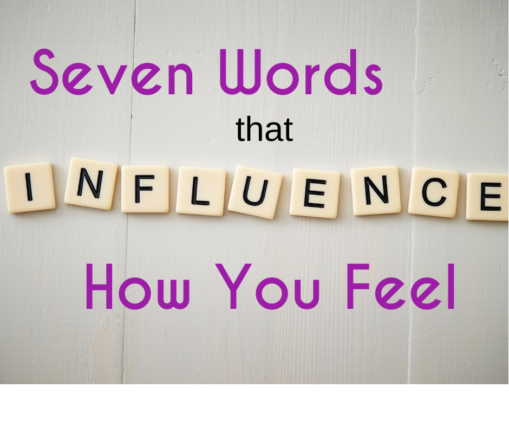
Last week I talked about 5 phrases to cut back on in your vocabulary and this week it’s Seven Words that could be beneficial for you to cut back on using in your vocab…
Like I said last week, language can intensify your stress, anxiety or guilt which means that when you change your language it can also lessen your stress, anxiety or guilt.
The language you use is more powerful than you realize.
It may benefit you to taper back on using the following seven words.
Word #1: ALWAYS
- “You’re ALWAYS late.”
- “You ALWAYS do that.”
- “I ALWAYS get taken advantage of.”
Certainly, there may be many times when “always” feels accurate.
But other times, it keeps you in a cycle of believing that things can’t get better, or it prevents you from extending some patience and understanding to someone who has slipped up.
Does it really ALWAYS happen??
Do they really ALWAYS do that??
The people you are in relationships with don’t like to hear that they ALWAYS do this or that.
It’s also not good for you to say that you ALWAYS do somethings.
- “I ALWAYS mess up.”
- “I ALWAYS overeat.”
- “I ALWAYS say something wrong.”
- “I ALWAYS give in.
Start watching your use of the word ALWAYS and see if you could benefit from using it less..
Try using SOMETIMES…ON OCCASION
Sometimes or on occasion they do this or that.
Sometimes or on occasion–I do this or that.
Word #2 NEVER
“NEVER” can do equal damage when it is used to get rid of hope, flexibility, or the benefit of the doubt.
“NEVER” isn’t true very often and it’s rarely helpful.
- “They NEVER help out.”
- “They NEVER say they’re sorry.”
- “They NEVER do it right.”
Sometimes people use NEVER in a negative way towards their own life.
- “I NEVER catch a break,”
- “I NEVER know what to say.”
- “I NEVER do well in presentations.”
- “I’ll NEVER figure it out.”
- “Things will NEVER get better.”
- “I’ll NEVER be able to do what I want.”
Word #3-“EVERYTHING”
“Everything” is often unhelpful when it is used to make a mountain out of a molehill.
It can be so tempting to say that “everything” is going wrong.
When you say EVERYTHING is going wrong, it can start to feel like “everything” is going wrong, and that itself can prevent you from seeing what is going right.
It can become a self-fulfilling prophecy, as you’ll see things as going wrong that really weren’t so bad.
Did EVERYTHING really go wrong or was it just one or two things that went wrong?
Word #4 TOTALLY
- “This job TOTALLY stinks”
- “Something’s TOTALLY wrong with her”
- “My house is TOTALLY a pigsty.”
When you use the word “TOTALLY” you blind yourself from seeing the positives of a situation or a person, putting on filters that keep out the good in order to align with your already established perspective that recognizes the bad – which keeps you stuck.
You keep seeing things–
- that prove your job sucks-
- reasons why she’s defective
- proof your house is a pigsty.
Word #5 “RUINED”
Sure, some things in life get completely ruined: like your phone when it goes through the washing machine, but the word “RUINED” is also often used to catastrophize things that don’t need to be catastrophized.
Have you ever accused your partner or children of “RUINING” a special event?
“Now, you’ve RUINED everything!”
Have you ever had a setback on a personal project you were working on and thought that it was now all “RUINED”?
“I’ll never be able to get this project done–it’s completely RUINED.”
It may be helpful in those situations to reframe the experience.
Is there a new path you take now that will help you learn something?
Even though it may no longer be the exact way you saw it going in your own mind, is it really ruined?
Maybe it will just look and be different than what you thought.
Maybe it will be better.
Are there aspects of the situation that can be salvaged in a positive way?
If so, then nothing’s truly RUINED.
Look for the silver lining instead of catastrophising.
Word # 6–“EVERYONE or NO ONE”
Do you generalize, especially negatively, to assume that “NO ONE” uses their turn signal anymore, or “EVERYONE” around here is a terrible driver.
- “Everyone leaves this place a pigsty.”
- “No one picks up after themselves.”
- “Everyone around here is crazy.” (or lazy)
- “No one understands.” (or cares)
It’s kinda like always or never. It can make you feel like it’s you against everyone else.
Really–NO ONE does?
Really–EVERYONE does?
Word #7–“ANYMORE”
As with the other words, there are times when this word can be used in positive ways: like– I don’t do that bad habit anymore.
But other times, it can be used to bring you down.
- “People just aren’t as nice ANYMORE.”
- “I’m not good at X ANYMORE.”
- “No one around here cares ANYMORE.”
- “It just won’t ever be the same ANYMORE.”
- “Kids just aren’t like that ANYORE.”
To assume that something positive just can’t happen ANYMORE, or that things have changed for the worse, denies you the opportunity to have hope for the future.
How often are you using these words?
Always
Never
Everything
Totally
Ruined
Everyone or No one
Anymore
What context are you using them in?
Could it benefit you to change your usage of these words?


